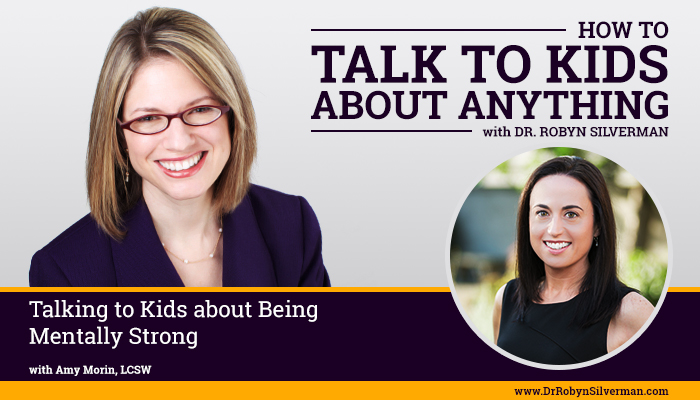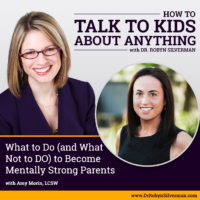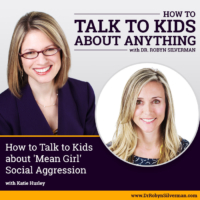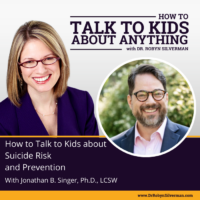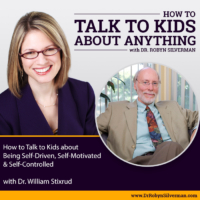Podcast: Play in new window | Download
Subscribe: Apple Podcasts | RSS | More
How to Talk to Kids about being Mentally Strong
This podcast will focus on talking to kids about mental strength based off of Amy Morin’s international best seller, 13 Things Mentally Strong People Don’t Do. How do we help our kids get rid of the bad habits that keep them stuck and give them the tools to help them to move forward when bad things happen? This episode of How to Talk to Kids about Anything gives parents, educators and coaches tips and scripts to help kids learn how to be mentally strong and drop the habits that can compromise their mental strength.
Special Guest: Amy Morin, LCSW
Ever wonder: What is the secret of success? Is it intelligence? Talent? Luck? Perhaps a bit. But more and more 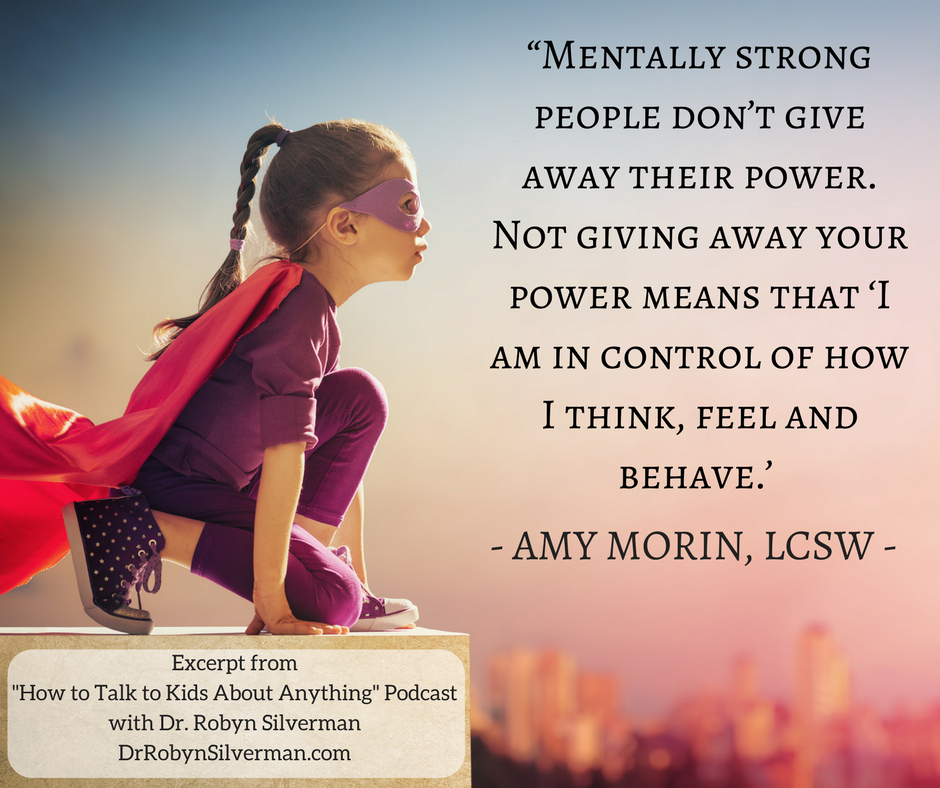 the research is telling us that the X-factor—the reason why some people fail and other succeed comes down to grit or what is sometimes referred to as mental toughness or mental strength. What is mental strength? How can we develop it? And How can parents, teachers and coaches help kids to develop mental strength? These are just some of the questions we are going to get answers to on today’s podcast with Amy Morin.
the research is telling us that the X-factor—the reason why some people fail and other succeed comes down to grit or what is sometimes referred to as mental toughness or mental strength. What is mental strength? How can we develop it? And How can parents, teachers and coaches help kids to develop mental strength? These are just some of the questions we are going to get answers to on today’s podcast with Amy Morin.
Amy Morin is a licensed clinical social worker, college psychology instructor, and psychotherapist. She is the author of the bestseller 13 Things Mentally Strong People Don’t Do, as well as 13 Things Mentally Strong Parents Don’t Do and 13 Things Mentally Strong Women Don’t Do. Amy serves as Verywell‘s Parenting Teens Expert and Child Discipline Expert, and is a regular contributor to Forbes, Inc., and Psychology Today. She is the only person in the psychology industry who is talking about mental strength on a global level. She was named the “self-help guru of the moment” by The Guardian. She lives in Marathon, Florida.
This podcast provides:
- Tips: How we help kids become mentally strong and avoid habits that keep us stagnant.
- How to model (and what to say!) when negative thoughts, feelings and situations come into our heads and lives.
- Teaching kids how NOT to feel sorry for themselves and get out of the pity party.
- Teaching kids how NOT to give away their power.
- How to help kids change their script in their heads that can be mentally debilitating.
- How to help kids NOT make the same mistakes again and again.
- The difference between punishment and discipline and why it’s important.
- How to help kids think through how to resolve conflict so that s/he has those tools. Correct the behavior, not the emotion.
Important Messages:
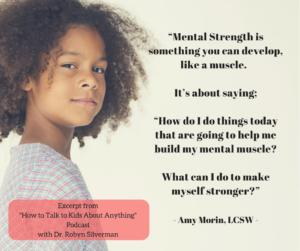
- Mental strength is about managing your thoughts, being aware of your feelings and being productive with your behaviors.
- Mental strength is something you develop, like a muscle.
- We can always become mentally stronger—it’s about the choices we consistently make. We need to tolerate being uncomfortable and pushing through it.
- Mental strength can happen in steps- small steps first, then bigger steps later. It all starts with one first step!
- As adults, we must model how to cope with negative feelings—not by smooshing them down, but by speaking in loud and showing how we deal with our emotions. What are our positive coping skills?
- Watch all or nothing thoughts. Are these “true” or “blue” thoughts?
- Use gratitude to go after the good in each day.
- Use stories to help keep things in perspective but also to show empathy and validation.
- We need to help kids realize that, even as a kid, they do have choices and they do have power to make those choices. We don’t want kids to feel that other people are in charge of their attitude—such that they become dependent on other people and their circumstance to regulate their mood.
- Get some distance from the voice in your head that tells you that you are not good enough- give it a voice.
- Scripts can provide a child with what to do when you are not there.
- Discipline- teaching kids something so they can do better next time or Punishment- inflicting punishment for something already happened.
- Make a list of the choices your child can make in frustrating situations or make a calm down box.
- Provide the consequences without shaming for their feelings.
Notable Quotables:
- “When it comes to mental strength, sometimes it’s not about what you do but what you don’t do.”
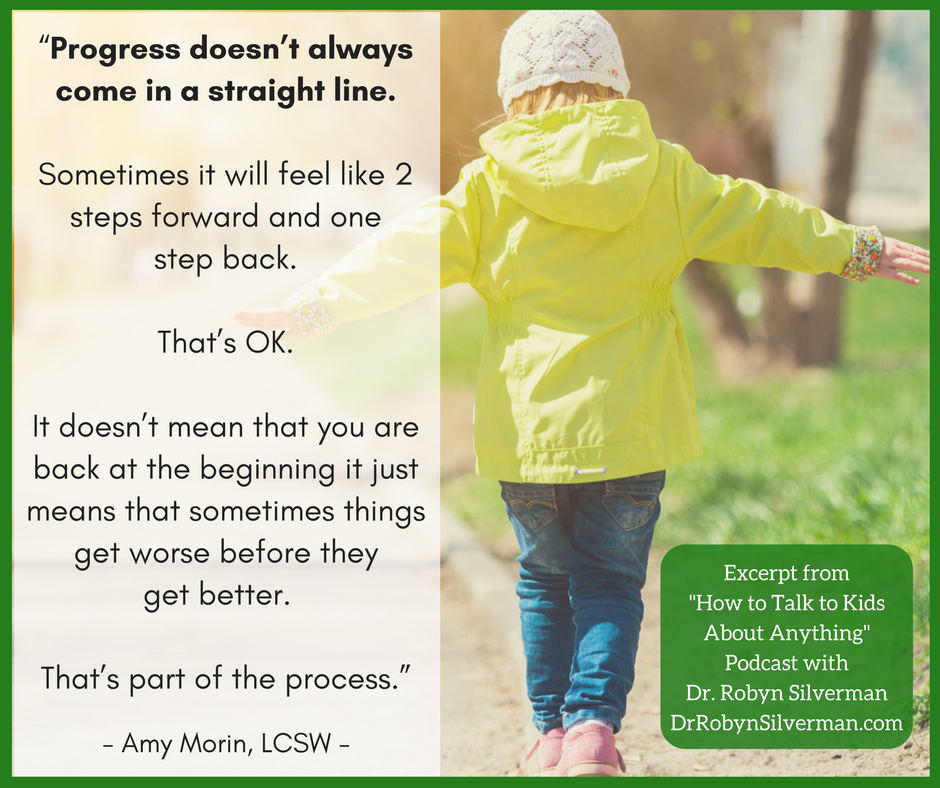
- “Mental Strength is something you can develop, like a muscle. If you want to become physically strong, you go to the gym and you work out. But if you really want to make more progress, you have to quit doing the bad habits too- like you don’t want to eat too many jelly doughnuts on the way home from the gym, otherwise you’ll cancel out your progress. Mental strength is the same. It’s about saying; “how do I do things today that are going to help me build my mental muscle? What can I do to make myself stronger?”
- “Sometimes people think, if I have depression, I am mentally weak. But that’s not true at all. Just like if someone had diabetes, they can still be physically strong—it may be a complicating factor but it’s all about the choices you make. So even if you are suffering from depression or anxiety or any host of other problems you can still make choices every day to become mentally stronger.”
- “In the beginning, you don’t need to take a huge leap. You can just take one teeny, tiny step and when you keep doing that over and over again, it gets a little bit easier.”
- “There’s no timeline for mental strength. For some people, maybe it’s just one month and they feel they’ve taken a huge leap. For other people, they might feel that it’s been 30 days and they are still taking baby steps. But as long as you are taking steps in the right direction, that’s okay! Just keep moving.”
- “The statistics say that only 17% of us are functioning at optimal mental health. A lot of people would never want to admit that they are not one of the 17% but the truth is that most of us have plenty of room for improvement!”
- “It’s ok for your child to be sad or disappointed, but what you don’t want is for them to exaggerate and extrapolate that this one thing is going to ruin his life.”
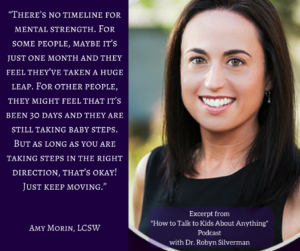 “Mentally strong people don’t give away their power. Not giving away your power means that ‘I am in control of how I think, feel and behave.’ Kids obviously have limited power in the world so we can let them know that they do have some power so that when their child is being peer pressured, they can say no.”
“Mentally strong people don’t give away their power. Not giving away your power means that ‘I am in control of how I think, feel and behave.’ Kids obviously have limited power in the world so we can let them know that they do have some power so that when their child is being peer pressured, they can say no.”- “Kids can say to themselves; “I’m in control of what I think and what’s a different conversation I can have with myself? That can be incredibly empowering for kids to be able to do that.”
- “Correct the behavior, not the emotion. For example; It’s OK to get angry but it’s not ok to hit your brother. So the next time you are angry, what can you do?”
- “Sometimes you need to let your kids make mistakes and learn the life lessons…what kind of life skills can you provide so that [your child] will make better choices next time?”
- “Progress doesn’t always come in a straight line. Sometimes it will feel like 2 steps forward and one step back for yourself and for your child…That’s OK. It doesn’t mean that you are back at the beginning it just means that sometimes things get worse before they get better. That’s part of the process.”
Resources:
The original Forbes article, read by millions, that became the foundation of Amy Morin’s book:
Book: 13 Things Mentally Strong People Don’t Do.
Book: 13 Things Mentally Strong Parents Don’t Do *** AVAILABLE FOR PRE ORDER RIGHT NOW!
Click Here to find out about cool bonuses you’ll get for pre-ordering!
If you LOVED this episode, please check out these…
Lynn Kenney: How to Talk to Kids about Big Feelings & Calming Down Techniques
Wendy Young: How to Talk to Kids about Anger & Big Feelings.
Margie Warrell: How to Talk to Kids about Being Brave
Jessica Lahey: How to Talk to Kids about the Gift of Failure
Michele Borba: How to Talk to Kids about Empathy & Entitlement

